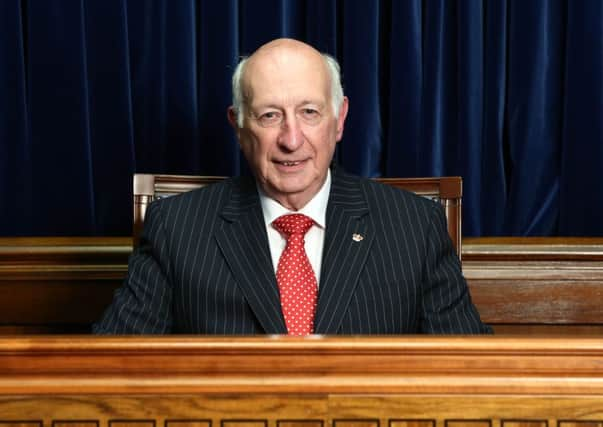Nesbitt tells Assembly speaker: Quit over '˜poor judgement'


In the letter, sent to him on Tuesday and circulated publicly on Wednesday morning, UUP leader Mike Nesbitt said that Robin Newton had displayed a “grave error of judgement” when presiding over the chaotic Assembly session on Monday, when members were debating the Renewable Heat Incentive (RHI) scandal.
The move comes after Mr Nesbitt had already suggested on Monday that the speaker should “reflect” on his position after the debate.
Advertisement
Hide AdAdvertisement
Hide AdBut his more recent intervention is more explicit, and directly asks him to quit – only around seven months into his term.
Mike Nesbitt’s e-mail accompanying his statement said that he is “asking him [Mr Newton] to stand down from his role after Christmas”.
The controversy largely centres on the procedures of the Assembly, set out in its standing orders – the de facto rule book for how the Assembly operates.
Last Wednesday, the speaker had received notice that the First and Deputy First Ministers wanted to recall the Assembly from its Christmas break, lasting from December 10 to January 8.
They were set to “make a statement on the RHI”.
Advertisement
Hide AdAdvertisement
Hide AdHowever, on Sunday Deputy First Minister Martin McGuinness indicated he did not support the statement, and that it was therefore not an “Executive Office position”.
Nonetheless, First Minister Arlene Foster was permitted to make her statement alone, in the absence of Mr McGuinness and without his support.
This raised major issues for MLAs, which go right to the heart of the nature of power-sharing.
The Executive Office is supposed to be a joint ministerial office, and was established as such after the Good Friday Agreement was ratified by the public.
Advertisement
Hide AdAdvertisement
Hide AdIn view of that fact, many MLAs asked how it was possible that the Assembly could be recalled.
On Monday morning, it was put to the speaker – who faced a barrage of queries from MLAs – that it was only possible to recall the Assembly to hear a ministerial statement, not merely a “personal one”.
It was also suggested that the decision to allow Mrs Foster’s statement to proceed “undermined” the whole point of power-sharing.
In response the speaker repeated, at least eight times, that he had “discharged my responsibilities” on the matter – an answer which failed to satisfy MLAs.
Advertisement
Hide AdAdvertisement
Hide AdMr Newton later released a statement to MLAs, explaining some of his decision-making.
He said that the first and deputy first ministers have exercised their powers jointly to recall the Assembly, and “any revocation of that act must, similarly, be undertaken jointly”.
He also stressed that it can sometimes fall to the speaker to take tough decisions, and that Monday’s situation had “clearly not [been] contemplated by this house in agreeing its standing orders”.
In his letter to the speaker, Mr Nesbitt said he had considered Mr Newton’s letter to MLAs, and it gave him “no pleasure” to call for him to quit.
Advertisement
Hide AdAdvertisement
Hide AdHe said he believed “the logic of your argument is flawed” when it comes to the claim that the First and Deputy First Minister must act jointly to undo a decision, after having both agreed upon it.
He said that the logical “end point” of such an argument would be that neither one of them could resign without the other’s agreement.
Mr Nesbitt noted that the speaker had, in the absence of an agreed statement from the First and Deputy First Minister, said that Martin McGuinness (or some other unspecified person acting on his behalf) could make a different statement of his own.
Mr Nesbitt said: “In my view, Mr Speaker, this risked undermining the joint nature of the Executive Office, which itself is a fundamental principle underpinning the 1998 Belfast / Good Friday Agreement and the 1998 Northern Ireland Act, representing a grave error of judgement on the part of your office.
Advertisement
Hide AdAdvertisement
Hide Ad“On that basis, and bearing in mind other incidents that do not require rehearsal in this letter, I regret to say you have lost the confidence of the Ulster Unionist Party.”